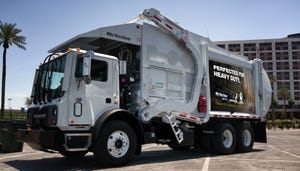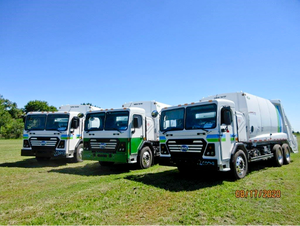Haulers Adapt To New Trash Disposal Demands
May 1, 1994
Ken Kelley
A recent World Wastes survey of public and private readers from coast to coast found haulers searching for more efficient ways to handle the collection of material going to landfills, finding new landfills to dispose the loads as the old ones close and purchasing new vehicles to meet today's increasing demands.
Haulers were generally pleased with the truck chassis and bodies they are using in their collection fleets, particularly with their packers. Hauling executives did, however, express concern over the shortage of competent drivers.
Interestingly, while those interviewed were wellinformed about landfill problems existing in their areas, none expressed alarm about growing efforts by federal and state regulators to reduce motor vehicle exhausts.
Here's a look at how our readers' landfill and related problems are affecting refuse hauling.
Because Hampton, N.H., will be closing its landfill this year, the city's garbage will soon be shipped out of town. Douglas Mellin, operations manager of the city's refuse department, notes that moving the loads by semi-trailer using the services of a private hauler remains a possibility.
Meanwhile, Mellin's department must improve its own program. It has recently added its first two-man collection vehicle using a Peterbilt chassis with right-hand drive. The attempt to increase efficiency from three- to two-man crews has progressed smoothly, with more two-man equipment on order, according to Mellin.
Beverly Hills, Calif., faces a problem encountered in many areas - a need to reduce the amount of refuse going to the landfill. The city has received excellent cooperation from its 32,000 residents and from the visitors, shoppers and office workers who boost the daytime population to around 200,000, said Joe Delaney, solid waste superintendent. He adds that the city's recycling program has helped decrease the abundance of trash.
Delaney's trucking operation has been "helped a great deal" by a fleet efficiency study conducted by a consulting firm. "They compared our department with those in five similar cities and came up with a lot of worthwhile suggestions," he said. "They got us rechecking our routing plans."
Reducing refuse volume is an important consideration across the country. For example, according to William Penn, the refuse manager for Chattanooga, Tenn., "Our citizens know that recycling is an important effort, and they are very cooperative. We have been using curb- side pickup of recyclable items and opened a drop-off center." Chattanooga plans to increase its curbside collection efforts this year.
Joe Whitson, who is in charge of the city's vehicle maintenance, mentioned that his fleet of 27 Heil packer bodies have performed well.
And Jon Kreiger, maintenance superintendent for Silver State Disposal Service, Las Vegas, noted that the trucks he buys "have undergone improvements lately - the backs of cabs are stronger, they have better paint jobs and the frames are improved," he observed. He suggested that there should be two classes of fiberglass cabs: standard for on-highway use and heavy-duty for trucks that travel off-road.
According to Kreiger, Silver State's landfill business is growing as unlined landfills are being closed by the state. His company is now prepared to handle medical wastes as well as atomic spills.
Despite confusion in the marketplace, many refuse haulers are shopping for new vehicles. This fact reflects the growing volume of activity in the truck market.
For instance, B&G Recycling in Battle Creek, Mich., has experienced so much growth that it is looking at trucks with hydraulic packer bodies to replace standard models which were previously used to handle refuse and which relied on hand methods, said Gregory Moore, president of the company.
Careful consideration of the appropriate trucks and other equipment for your operation is crucial. Steve Triplett, the solid waste coordinator in Cape Girardoux, Mo., explained that his department took the time to order trucks with a high frame height. The placement allows them to take containers at a level that reduces wear and tear while making collections from commercial accounts.
Sometimes the smaller items play the biggest role in making refuse trucks efficient. John Giroux, solid waste manager in Waterville, Maine, said that his operation has no complaint with current equipment that includes bodies with multiple compartments to segregate recyclables into nine classes. When you can sell some recyclables for $130 a ton, you can afford to buy a more sophisticated truck body.
Like passenger car owners, refuse truck users tend to stick with features and brands that served them well in the past. Robert Malott, manager of Perry's Solid Waste Disposal in Oakland, Md., is pleased with his company's Mack trucks, noting that his company recently rebuilt a Mack engine with 426,000 miles on it. To cope with rising volume, the firm is preparing to convert to roll-off bodies moved by Mack chassis.
As trucks are forced to carry bigger loads longer distances to the nation's larger landfills, the need for trucks that are built to withstand heavy-duty, off-road use has never been more critical.
You May Also Like


